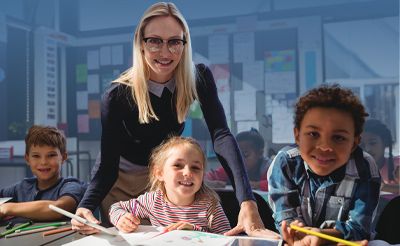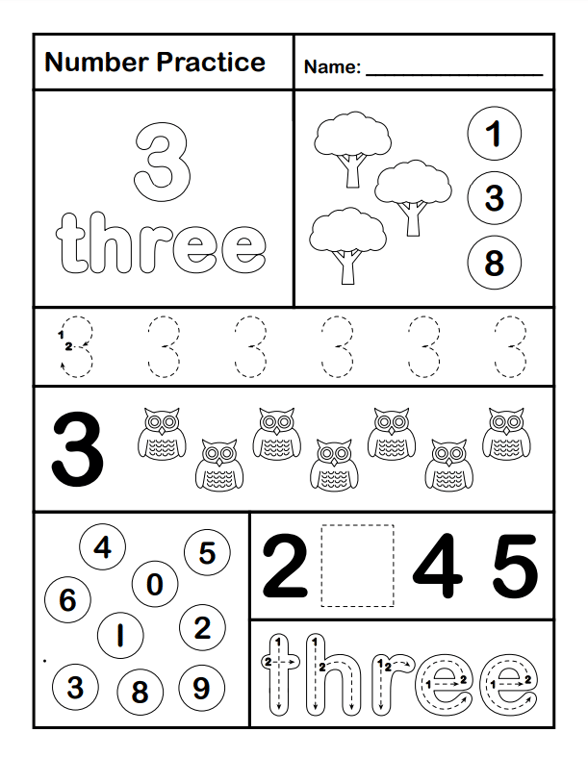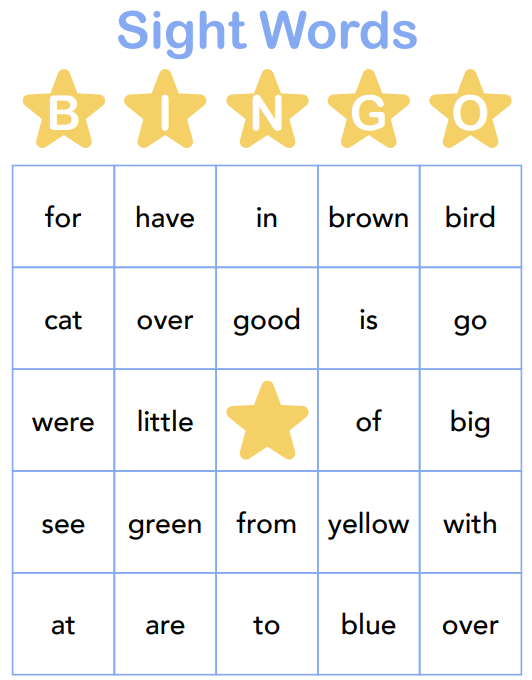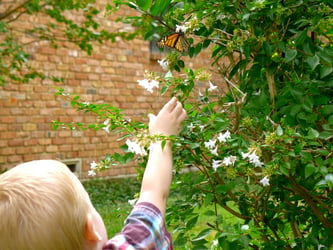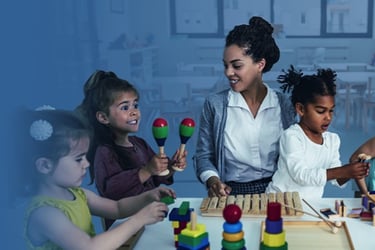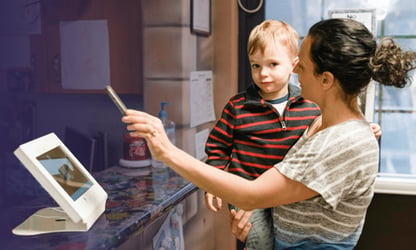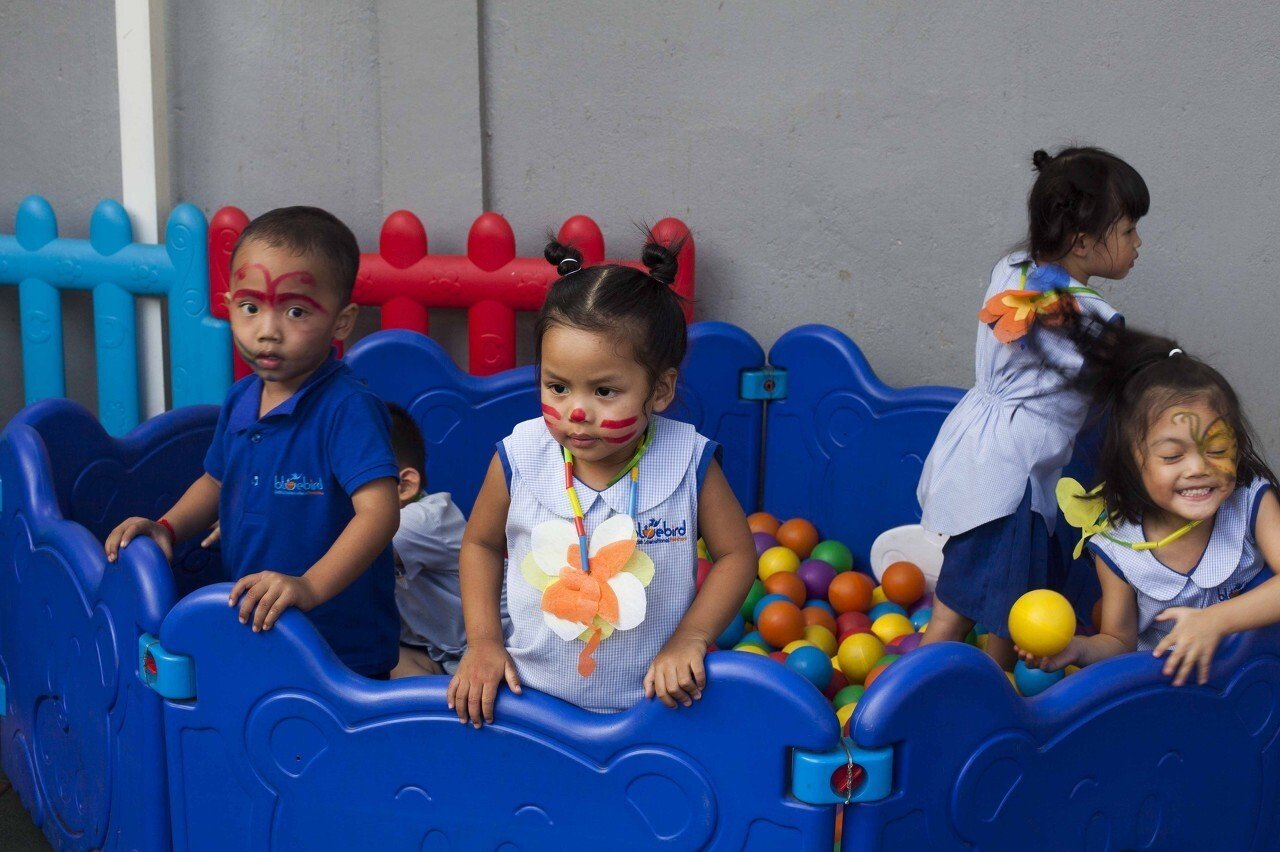
Great large group activities for preschoolers are not only fun and engaging but also play a crucial role in their overall development. These activities offer a multitude of benefits for young children, from enhancing social skills to promoting cognitive growth. Play with preschoolers through fun large group activities helps children develop self-regulation skills in addition to getting exposure to math, science and literacy concepts.
Let's explore the importance of large group activities for preschoolers and provide a comprehensive list of math, circle time, literacy, science and arts and crafts activities to keep them entertained and learning. For more insights for your school, check out the differences between daycare vs preschool.
Table of Contents
- Why Are Large Group Activities Important for Preschoolers?
- Math Activities for Preschoolers
- Circle Time Activities for Preschoolers
- Literacy Activities for Preschoolers
- Science Activities for Preschoolers
- Arts and Crafts Activities for Preschoolers
- FAQs
Why Are Large Group Activities Important for Preschoolers?

Group activities are a vital part the development of many preschool competencies, such as gross motor skills. These often can often include fun group games designed for preschool children. Here are just a few of the benefits of group discussions and activities.
- Social skill development: Interacting with peers teaches cooperation, sharing, empathy and teamwork. Kids learn to communicate and work together (University of Leeds).
- Observation: Social, emotional, physical and cognitive skills are often best observed when kids are engaging with each other in groups during indoor games or outdoor play. Observing kids when they are in groups gives preschool teachers the chance to see where certain students need intervention (CDC).
- Cognitive growth: Group challenges encourage problem-solving, critical thinking and decision-making. Preschoolers explore new ideas and gain knowledge collaboratively (Early Experience and Human Development).
- Motor skill enhancement: Active play in groups promotes coordination, movement abilities and physical confidence. Structured fun gets little bodies moving! (American Academy of Pediatrics)
- Holistic learning: The dynamic social environment of group preschool activities fosters comprehensive development across domains — social-emotional, cognitive and physical. It's a key piece of early education.
- Positive relationships: Connecting with other children and educators through fun games and engaging activities nurtures a sense of belonging, social bonds and an enthusiasm for learning.
By participating in well-designed preschool group games and experiences, children develop essential abilities that set the stage for future social and academic success. Far from just playtime, large group activities are a powerful tool for early development!
Math Activities for Preschoolers
Through math activities, preschoolers can develop critical thinking skills by solving problems and making decisions. Manipulating objects like counting blocks or sorting toys also helps strengthen their fine motor skills. Activities such as pattern recognition and shape sorting enhance their spatial awareness and reasoning abilities. By engaging in math play, children improve their number sense and build a strong foundation for future learning in mathematics.
Counting Games
Counting games for preschoolers are a great way to get them to exposed to basic numerical concepts and enhance their cognitive skills through interactive learning experiences. These games for kids can make math enjoyable and engaging for young learners. Here are a few examples of math games that are great for large or small groups.
Counting Critters
This fun activity has children match a specific number of toy animals with the corresponding number on a card. This hands-on activity not only helps in mastering counting skills but also improves their memory and visual recognition. Looking for counting critter game ideas? Education.com has a free computer game and lesson plan for group activities here.
Number Hunt
Another fun activity is where kids search for and collect objects in the house or preschool class that represent each number from 1 to 10. This game encourages observation, critical thinking and enhances their problem-solving abilities.
Looking for tips on how to pull off a fun number hunt activity? This resource describes a cost-effective way to do it.
Shape Sorters
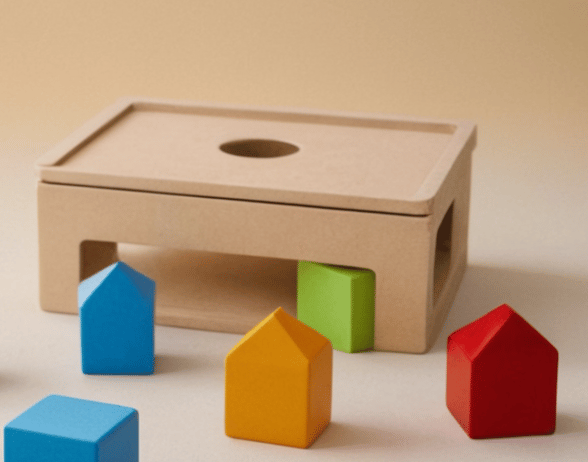
Shape sorters not only help preschoolers identify different shapes but also enhance their fine motor skills through hands-on manipulation. These activities promote both cognitive development and physical dexterity in young children.
Engaging in shape-sorting games can greatly benefit preschoolers in developing their hand-eye coordination and spatial awareness, crucial skills that lay the foundation for mathematical concepts. By fitting the correct small object shapes through the corresponding slot, children refine their ability to analyze shapes and sizes, which is essential for understanding geometry and spatial relationships later on.
Math Worksheets for Preschoolers
Sometimes a simple preprinted activity will help young students learn, especially when they're indoors. Click below to access the five pack of free number printables for a fun learning adventure designed for individuals and groups of all sizes.
If you're looking for more free templates and printables for preschools, we've produced 70+ free ones you can use. It is part of our commitment to saving preschools like yours time through free materials and our innovative preschool management software.
Number Bingo
Number bingo is a popular math activity for preschoolers that combines learning with interactive gameplay. It helps children recognize numbers, improve counting skills and fosters a love for math in a fun and engaging way.
One of the great benefits of number bingo is that it not only teaches preschoolers how to identify numbers but also enhances their ability to count accurately. Through the playful setting of a bingo game that kids will love, children are encouraged to actively participate and interact with numbers in a hands-on manner. This fosters a positive association with math from a young age, setting a strong foundation for future learning. The social aspect of playing bingo with peers adds to the interactive and engaging nature of the activity. If you're looking for free printables and instructions for this activity, check out this resource.
Circle Time Activities for Preschoolers
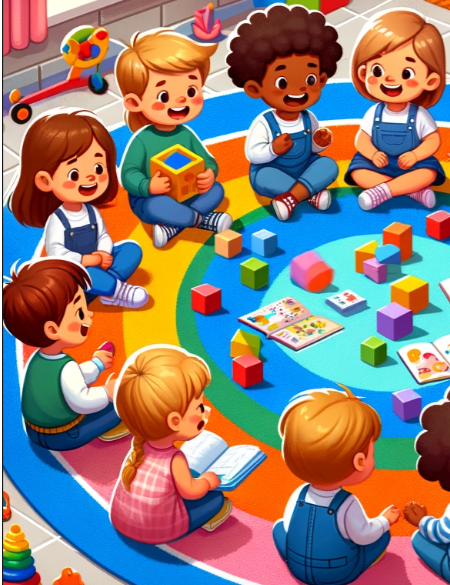
Circle time activities provide preschoolers with valuable opportunities for social interaction, music appreciation and engaging games. These activities are designed to promote cooperation, shared experiences and a sense of community among young children.
During circle time, children gather in a designated area to participate in structured activities led by a teacher or caregiver. This routine not only enhances their listening and attention skills but also fosters a sense of belonging and inclusivity.
Singing and Movement Songs
Singing and movement songs are integral components of circle time activities for preschoolers, fostering social interaction, music appreciation and physical coordination.
Through these interactive songs, preschoolers not only learn to follow rhythm and melody but also develop essential social skills such as taking turns, sharing and working collaboratively with their peers. Get them moving and learning at the same time!
Examples of popular interactive songs for circle time include 'The Wheels on the Bus', where children can mimic the actions of the bus wheels going round and round, and 'If You're Happy and You Know It', which encourages children to express their emotions through movement.
Storytelling
Storytelling during circle time activities enriches preschoolers' language development, stimulates cognitive growth and nurtures imagination. These narrative sessions enhance listening skills and encourage creativity among young learners.
Show and Tell
Show-and-tell activities are circle time ideas that allow preschoolers to express their creativity, share experiences and engage in a community challenge. These interactive sessions promote self-confidence, communication skills and a sense of belonging within the group.
Literacy Activities for Preschoolers
Engaging preschoolers in literacy activities lays a strong foundation for their educational outcomes, fostering language development, alphabet recognition and phonemic awareness. These activities combine learning with play to make language exploration fun and interactive for young learners.
Letter Recognition Games
Through the engagement with educational games, children not only learn the letters of the alphabet but also develop crucial skills such as memory, attention and problem-solving. Activities for preschool like 'Letter Bingo' make learning fun and memorable, fostering a positive attitude towards language exploration. As kids match letters with corresponding objects or sounds, their cognitive abilities are sharpened, leading to improved focus and concentration in other learning tasks.
Rhyming Activities
Through the use of rhyming words, children not only improve their ability to recognize and manipulate sounds in words but also develop essential pre-reading skills. Rhyming activities can be incorporated into everyday routines, such as singing nursery rhymes, playing rhyming games or reading rhyming books. These interactive exercises not only make learning fun but also stimulate multiple senses, promoting better retention and understanding of language concepts. Engaging the imagination through rhyming fosters a love for language and sets a strong foundation for future literacy success.
Sight Word Bingo
Looking for a fun take on an old idea? Get ready to energize your sight word practice with a classic game gone educational — Sight Word Bingo! This clever twist on traditional bingo helps kids master common words in a flash. Instead of numbers, the cards feature essential sight words, turning rote memorization into an engaging, interactive experience.
And here's the best part: We at Vanco have crafted a set of free, printable Sight Word Bingo cards, ready for you to download and use immediately. Say goodbye to boring drills and hello to fun-filled learning!
Alphabet Scavenger Hunt
This engaging game encourages young learners to actively seek out letters in their surroundings while associating them with relevant objects or words.
- For instance, finding 'A' in an apple or 'S' in a sock can make learning the alphabet a hands-on and exciting experience for children.
- Such interactive games not only foster letter recognition but also enhance vocabulary development by linking letters to real-world items.
Looking for free materials to help you pull off this scavenger hunt? This resource offers printables and detailed instructions.
Science Activities for Preschoolers
By incorporating STEM principles into play, children learn to observe, question, experiment and draw conclusions. Encouraging outdoor exploration further enriches their learning experiences, fostering a connection with nature and promoting a healthy lifestyle.
Sensory Bins
In preschool learning activities, incorporating different materials like rice, sand or water coupled with colorful objects can develop children's sensory perception and language skills. Engaging in sensory play has been linked to improved concentration and problem-solving abilities, crucial for overall cognitive development. For example, setting up a sensory bin with hidden objects for children to find encourages them to use their sense of touch and observation skills.
Nature Walks
The outdoors serve as a giant classroom where kids can learn about plants, animals, weather patterns and ecosystems in a hands-on manner. Through these adventures, they develop critical thinking skills, enhance their cognitive abilities and strengthen their physical health by being active outdoors in large open areas. You can also incorporate large group games and gross motor activities as part of these lessons.
Sink or Float Experiment
The Sink or Float Experiment is a captivating science activity for preschoolers that introduces the concept of buoyancy through hands-on discovery. This interactive experiment engages children in predicting outcomes, testing hypotheses and exploring scientific principles.
This experiment is not only educational but also incredibly fun for young learners.
- To start, gather various items like plastic toys, wooden blocks and coins for the children to test.
- Next, fill a tub with water and encourage the children to drop each item one by one and observe what happens.
- Watch as their faces light up with excitement when they see some items float while others sink.
This hands-on approach helps them grasp the basic principles of density and volume in a memorable way.
Arts and Crafts Activities for Preschoolers
Arts and crafts activities ignite creativity, promote fine motor skills and allow preschoolers to express themselves through imaginative projects. These hands-on experiences with craft materials foster artistic exploration and aesthetic appreciation in young children. These are just a few examples of stimulating activities that can engage a child's senses and cultivate their imagination:
- Coloring
- Painting
- Sculpting
- Collaging
Finger Painting
This tactile experience allows children to experiment with different colors, textures and shapes, fostering artistic development and self-expression.
Setting up a finger-painting station for little ones can be a fun and exciting activity. Make sure to cover the work area with old newspapers or a plastic tablecloth to protect surfaces from paint splatters. Prepare a variety of nontoxic, washable paint colors in small containers to offer a wide range of choices for your child. Encourage them to explore different painting tools like sponges, paintbrushes or even their fingers to create unique textures and patterns.
Playdough Creations
Hands-on projects using playdough not only allow young children to express their creativity but also help them refine their fine motor skills as they mold, flatten and shape the dough. Manipulating the playdough requires precise movements, which in turn strengthen the muscles in their fingers and hands. The process of planning and executing their creations aids in cognitive development by fostering problem-solving skills and spatial awareness.
Collage Making
When engaging in collage making, preschoolers have the opportunity to explore different themes that resonate with them, such as nature, seasons or animals. Encouraging them to discuss these themes with each other fosters their communication skills and the ability to understand diverse perspectives. Providing a wide array of materials like colored paper, magazines, fabric scraps and stickers enhances their tactile experience and enables them to experiment with textures. This collaborative process not only sparks their creativity but also teaches them valuable lessons about teamwork and cooperation.
Frequently Asked Questions
What are some math-based large group activities for preschoolers?
Some math activities for preschoolers include counting games, shape-sorting activities and number-matching games. You can also incorporate counting into songs and fingerplays for a fun and engaging way to learn math as part of group movement activities.
What are some circle time activities for preschoolers?
Preschool circle time activities can include group songs, story time and movement activities like Simon Says or Red Light, Green Light. You can also incorporate counting, shapes and colors into circle time to make it educational. Here is a full list of circle time songs and activities you can use.
Circle Time Songs for Preschool
Circle Time Activities for Preschool
How can I incorporate literacy into large group activities for preschoolers?
You can have a book of the week and read it during circle time or have a designated reading corner where children can explore books on their own. You can also play storytelling games or have children act out stories for a fun and interactive way to incorporate literacy and movement activities for preschoolers.
Are there any printable materials available for large group activities for preschoolers?
Yes, there are many free printable materials available online for large group activities for preschoolers. You can find printable worksheets, coloring pages and educational games that can be used in a large group setting. Education.com is a popular source for free materials. For preschools, there are thousands available. All you need to do to access these materials is sign up for a free account.
What are some sensory-based large group activities for preschoolers?
Sensory activities like finger painting, sensory bins and water play can be great for large group activities. You can also incorporate sensory materials like sand, playdough or shaving cream into fun indoor learning activities to engage all of the senses.
How can I make large group activities for preschoolers inclusive and accommodating for all children?
When planning large group activities, indoors or outdoors, consider including activities that accommodate different learning styles and abilities. You can also provide adaptations or modifications for children who may need extra support and self-regulation skills and encourage teamwork and inclusivity among all children. If you're looking for additional information and resources on how to make activities more inclusive for preschoolers, the Early Childhood Learning and Knowledge Center offers (Early Childhood Learning and Knowledge Center) detailed instruction here.
Get 100+ Editable and Printable Templates for Almost Every Preschool Situation
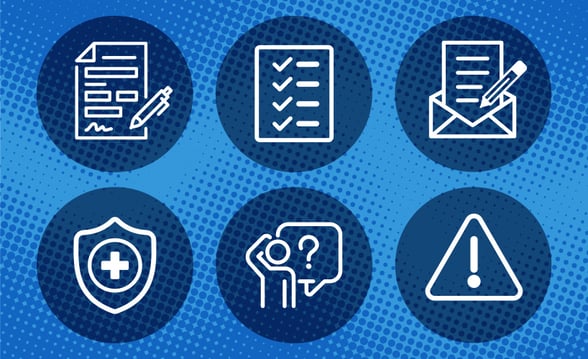
We know daycare providers like you are busy. That's why we made dozens of templates to help you manage the various aspects of your organization. From billing and invoicing to marketing materials, we have it all. Download all 70 today!
References
Balaban, M., & Simion, F. The Relationship between Social and Cognitive Development. In Social and Cognitive Development (pp. 179-198). Springer, Boston, MA. https://link.springer.com/chapter/10.1007/978-1-4615-9215-0_8
Centers for Disease Control and Prevention. (n.d.). CDC's "Learn the Signs. Act Early." Campaign Go Out and Play! Kit. https://www.cdc.gov/ncbddd/actearly/pdf/ccp_pdfs/gop_kit.pdf
Erdoğan, T. The Effect of Cooperative Learning on the Learning Approaches of Students with Different Learning Styles. The European Educational Researcher, 4(1), 59-82. https://files.eric.ed.gov/fulltext/EJ1287158.pdf
Hagan, J. F., Shaw, J. S., & Duncan, P. M. Promoting Physical Activity. In Bright Futures: Guidelines for Health Supervision of Infants, Children, and Adolescents (4th ed.). American Academy of Pediatrics. https://www.aap.org/en/practice-management/bright-futures/bright-futures-materials-and-tools/bright-futures-guidelines-and-pocket-guide/


